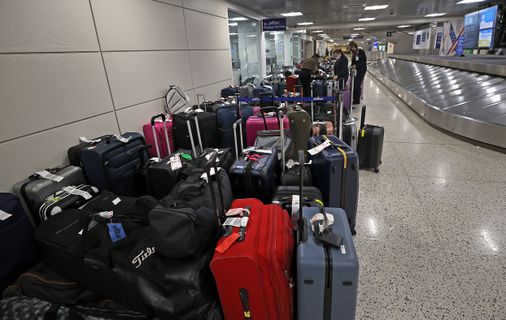No one likes feeling trapped in a terminal with nowhere to go. But there are ways to avoid travel headaches — and ways to get compensated if you can’t. Here’s a list of tips for your next trip, with advice from a veteran local flight attendant and gate agent.
Get The Big To-DoYour guide to staying entertained, from live shows and outdoor fun to the newest in museums, movies, TV, books, dining, and more.
Stay updated
The next time you book a flight, download the airline’s mobile app — it’s the best way to stay up to date with the most reliable information about cancellations and delays, according to Marisa, who’s been a flight attendant for 23 years. She currently works for Delta, and asked that her last name not be used.
“I always recommend having the app for the airline you’re traveling with,” Marisa said. “And have it set up for notifications. In situations where massive cancellations are taking place, you’re going to get help much quicker — and you don’t have to stand in line or get on the phone.”
She also recommends downloading an app that tracks overall departures for every airline. Marisa uses the Flight Board mobile app, and FlightAware is another popular resource.
“It’ll give you a better idea of what’s going on [outside] your airline, which can be helpful to know,” Marisa said.
Book direct
If possible, try to book directly through the airline rather than through a third party, which may make it more difficult to change your itinerary in case of a cancellation or delay.
“If a flight is delayed, you don’t have any [recourse] if you go through a third party, and that makes a big difference,” said Scyndie Murphy-Brown, a gate agent who works for Alaska Airlines.
Opt for an earlier flight
A departure early in the day is less likely to be delayed than a later flight, due to ripple effects of delays throughout the day, according to the US Department of Transportation website.
“Morning flights are less impacted by bad weather,” Marisa said, adding that as we head into summer, thunderstorms will be more frequent, which can impact flights around the country. That led Marisa to her next piece of advice…
Check the weather where you’re going
Just because it’s sunny in Boston doesn’t mean it’s sunny everywhere. Marisa recommends checking the weather at your destination, as well as in any connecting cities.
Know your rights
Believe it or not, travelers have a few.
If you’re stuck on a plane that’s been sitting on the tarmac for more than three hours, for example, airlines in the US might be in violation of the law. Airlines with planes stuck on the tarmac are required to give passengers a notification and an option to deplane within the first 30 minutes that they’re aware of a delay, according to the DOT. The rule went into effect in the past few years, and violations can amount to large fines for the airline per passenger. The rule also requires airlines to provide adequate food and water, ensure that lavatories are working and, if necessary, provide medical attention to passengers during long tarmac delays, according to the DOT website.
“[Airlines] are more likely to cancel flights these days to try and steer clear of that,” Marisa said of the new tarmac rules.
If a flight is canceled, most airlines will rebook you for free on their next flight to your destination as long as the flight has available seats, the DOT website said. If a passenger decides to cancel their trip as a result of a canceled flight, customers are entitled to a refund for the unused transportation — even for non-refundable tickets.
“You are also entitled to a refund for any bag fee that you paid, and any extras you may have purchased, such as seating assignment,” the website said. “If their airline offers a voucher for future travel, ask the airline about any restrictions that might apply, such as blackout and expiration dates.”
Passengers are also entitled to a refund if the flight is significantly delayed and they decide not to travel. What constitutes a significant delay is determined by the airline, and travelers should check the airline’s website for its contract of carriage for specific information.
If a flight is delayed or canceled and the passenger still decides to travel, US airlines are not legally required to compensate ticket holders. Each airline has its own policies, and there are no federal requirements. But you should still ask.
“If your flight is experiencing a long delay, ask airline staff if they will pay for meals or a hotel room. While some airlines offer these amenities to passengers, others do not,” the DOT said.
What about hitching a ride on another airline? If a flight is canceled, an airline can put a passenger on another airline’s flight, but they are not required to. But again, you should inquire.
“It does not hurt to politely ask your airline if it will transfer your ticket to another airline that has a flight with available seats,” the DOT advises. Travelers can also ask if the airline will transfer your ticket to that carrier, but again, they’re not required to do so.
Many situations are handled on a case-by-case basis.
Be patient and respectful
Much of the power lies in the hands of gate agents, so be respectful, Marisa said.
“It’s important to be patient when this stuff happens,” Marisa said. “Gate agents are the ones doing everything, and they can be so overwhelmed. Ask them how their day is going. Maybe bring them some chocolate. The gate agent is the one that’s going to give you that seat.”
Furthermore, staffing shortages are often at the root of airport frustrations.
“We’re short-staffed all the time,” Murphy Brown said. “People have to do doubles, overtime — because no one is there to work … I know all the airlines are suffering the same thing.”
Pack a few essentials in your carry-on
If travelers are checking a bag, pack a few essentials in your carry-on, Marisa said.
“I check my bags when I fly, but I do recommend keeping with you at least a change of underwear, a toothbrush, and if you have children, for sure a change of clothes for them,” Marisa said.
She also advises travelers checking bags to hang on to the tags given to them, which allows customers to track the exact location of their bag should they become separated from it.
Brittany Bowker can be reached at brittany.bowker@globe.com. Follow her on Twitter @brittbowker and on Instagram @brittbowker.













